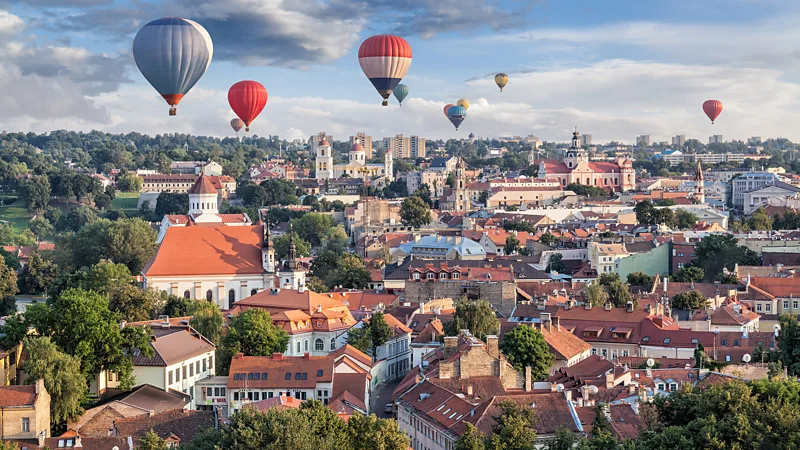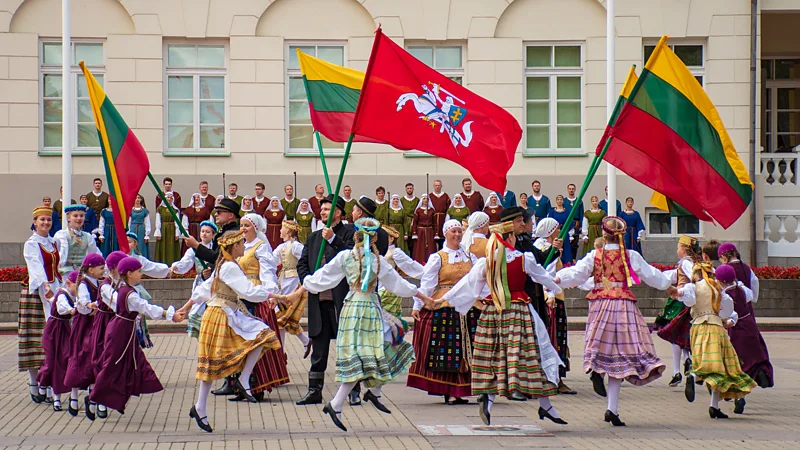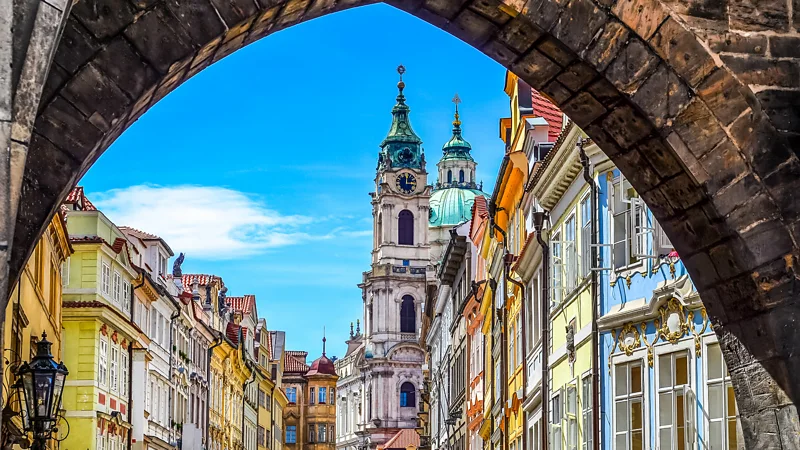The European region where young people are happiest
 The World Happiness Report for 2024 revealed an unexpected trend where Central and Eastern European nations like the Czech Republic, Lithuania, and Romania have notably climbed in happiness rankings, joining the traditional leaders like Scandinavian countries. This shift reflects a growing trend where these countries have surpassed some Western European counterparts in overall happiness, with the Czech Republic and Lithuania making it into the top 20 for the first time.
The World Happiness Report for 2024 revealed an unexpected trend where Central and Eastern European nations like the Czech Republic, Lithuania, and Romania have notably climbed in happiness rankings, joining the traditional leaders like Scandinavian countries. This shift reflects a growing trend where these countries have surpassed some Western European counterparts in overall happiness, with the Czech Republic and Lithuania making it into the top 20 for the first time.
What's particularly intriguing about this trend is the significant role played by the happiness of the younger population in these countries. Lithuania, for instance, has secured the top spot in the Happiness of the Young category, with other countries like Serbia, Romania, the Czech Republic, and Slovenia also ranking high in this regard. This indicates a noteworthy improvement in the well-being of younger residents across these nations.
This surge in happiness among the youth is understandable to both residents and frequent visitors of the region. According to Tim Leffel, author of The World's Cheapest Destinations, the availability of better job opportunities locally has discouraged young people from seeking employment elsewhere in Europe. This shift has resulted in more balanced demographics, with younger individuals choosing to stay in their home countries, thereby fostering a sense of optimism about the future among all age groups.
With a significant increase in GDP per capita since the early 2000s, many individuals in Central and Eastern Europe now perceive that they have equal opportunities for happiness, which is a crucial measure of overall well-being. Surprisingly, the World Happiness Report highlights that disparities in well-being have a greater impact on overall happiness than disparities in income.
In addition to economic growth, these nations are prioritizing infrastructure development, nurturing vibrant cultural environments, and leveraging their breathtaking natural landscapes – ranging from the sand dunes of the Curonian Spit to the Carpathian Mountains. This concerted effort has fostered a tangible sense of hope and enthusiasm among local residents.
To gain deeper insights into this newfound happiness, we interviewed residents and recent visitors to these countries. They shared their experiences and provided recommendations on how visitors can immerse themselves in this atmosphere of positivity and contentment.
Lithuania
 Lithuania, ranking 19th overall in the index and leading for residents under 30, has witnessed notable enhancements in quality of life according to its inhabitants.
Lithuania, ranking 19th overall in the index and leading for residents under 30, has witnessed notable enhancements in quality of life according to its inhabitants.
Jurga Rubinovaite, a Lithuanian and founder & CEO of the travel blog Full Suitcase, shared, "The majority of Lithuanians, particularly the younger generations, express a profound sense of happiness. Despite the ongoing war in Ukraine and persistent discussions in the media about the potential expansion of conflict to the Baltic States, people appear to be embracing and valuing life like never before."
Rubinovaite attributes Lithuania's high level of happiness to the freedom people have had since 1990, when the country regained independence from the Soviet Union. She notes that the ability to study, work, and travel anywhere has significantly contributed to this sense of contentment. She mentions that while younger generations didn't experience life before independence, they are familiar with the stories passed down by their elders, which instills a deeper appreciation for their current circumstances.
Additionally, Rubinovaite acknowledges the country's generous maternity and paternity policies, which are among the most extensive globally, with mothers receiving up to 126 paid days and fathers up to 30 days. She also highlights the importance of strong family networks in caring for children, contributing to overall well-being.
Resident Raminta Lilaitė-Sbalbi finds joy in Vilnius's vibrant cultural scene, its connection to nature, inclusive community atmosphere, and opportunities for personal growth and creative expression.
She highlights significant cultural events like the Lithuanian Song Festival, which celebrates its 100th anniversary this June and July. This festival, recognized by UNESCO, is a rare occasion where hundreds of choirs and thousands of people gather to sing on a grand open-air stage. Lilaitė-Sbalbi emphasizes the festival's historical significance in preserving Lithuania's national identity during the Soviet occupation, earning it the moniker of the 'singing revolution.'
The country's natural surroundings provide an avenue for happiness through a balanced work-life dynamic. "Lithuanians have a deep affinity for the outdoors," says Rubinovaite. They seize every opportunity to escape the city and immerse themselves in the forests, lakes, and stunning seaside landscapes.
Lilaitė-Sbalbi suggests that visitors explore hiking trails near Vilnius, such as the Strėva Green Trail, known for its unfrozen springs even in winter and a hill adorned with Lithuanian orchids. She also recommends the Karmazinai Nature Trail, an intriguing site featuring pagan rituals and ancient burial grounds.
Romania
While Romania is ranked 32nd overall in the World Happiness Report, it has experienced one of the most significant increases in happiness over the past decade, leaping from 90th place in the 2013 report. This surge in happiness is largely attributed to the country's youth, who have propelled Romania to the 8th spot for respondents under 30.
Experts suggest that this optimism stems from newfound freedoms and opportunities. In March 2024, Romania, along with Bulgaria, joined the EU's Schengen area, allowing for seamless travel without border checks. Additionally, Romania has been investing heavily in infrastructure, leading to improvements in the quality of life for both residents and visitors.
Daniel Herszberg, founder of the Travel Insighter website, notes the extensive construction of highways and infrastructure projects across the country, including smaller towns like Targu Mures. With an allocated infrastructure budget of €17bn for 2021-2027, Romania has been making significant progress, particularly in motorway construction.
Despite modern advancements, Romania's rich cultural heritage remains a major draw for locals and tourists alike. Current resident Alexandra Nima highlights the country's cultural diversity, from Saxon and Hungarian minorities to Romani and Romanian cultures. Transylvania, in particular, offers affordable and picturesque surroundings filled with art and historic sights.
Herszberg suggests embarking on a Transylvanian road trip to fully experience the region's beauty. Starting from Cluj Napoca, known for its medieval castles, travelers can visit attractions like the Bonțida Bánffy Castle, often dubbed "the Versailles of Transylvania." Continuing south to Brasov, surrounded by the Carpathian mountains, visitors can explore its medieval Saxon walls and vibrant cafe scene.
The Czech Republic
 Ranked 18th in overall happiness and 10th among respondents under 30, the Czech Republic has experienced a resurgence of community and culture, contributing to its rising happiness levels.
Ranked 18th in overall happiness and 10th among respondents under 30, the Czech Republic has experienced a resurgence of community and culture, contributing to its rising happiness levels.
According to Michael Rozenblit, founder of The World Was Here First, who has lived in Prague for two years, the emphasis on smaller living spaces has led to a strong focus on communal areas like parks, pubs, and cafes. Families, couples, and friends often gather in these green spaces after work, fostering a sense of community. Even during colder weather, the convivial pub and cafe scene remains an integral part of Czech culture.
This work-life balance is supported by government policies such as guaranteed vacation days, comprehensive healthcare, and parental leave. Mariko Amekodommo, an American residing in Prague, notes that employee benefit programs often include access to sports, physical activities, and wellness perks, contributing to the overall high standard of living.
Both Amekodommo and Leffel recommend exploring areas outside of Prague to fully experience Czech culture and landscapes. Amekodommo suggests that even short train rides from the city can lead to stunning castles, unique attractions like the bone monastery, and untouched nature. Leffel highlights smaller towns such as Olomouc, Brno, and Plzeň, which provide insight into the Czech way of life. For beer enthusiasts, a visit to Plzeň's Pilsner Urquell brewery is a must-see, symbolizing a pilgrimage for beer lovers akin to wine enthusiasts visiting Bordeaux or coffee aficionados journeying to Ethiopia.
The Czech Republic's long-standing beer heritage was recently honored with Žatec being designated a UNESCO World Heritage site for its tradition of cultivating and processing hops, a crucial ingredient in beer brewing today.












































